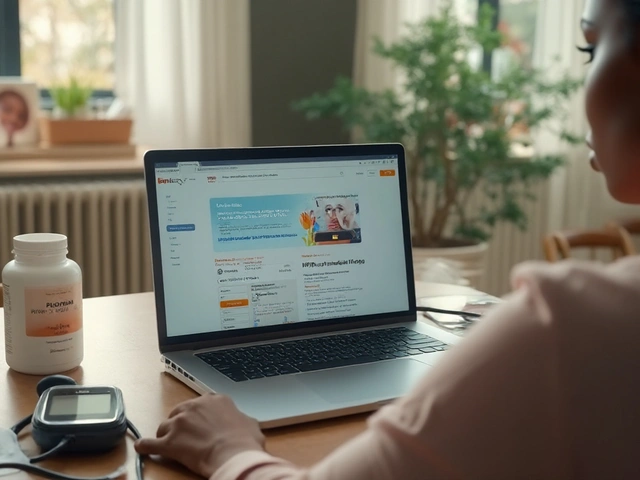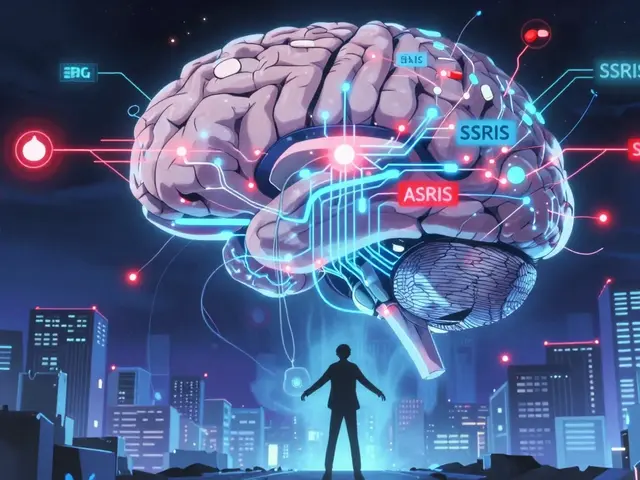Ever met a medicine that wears a ton of hats? Endep is that guy. Used for everything from putting messy thoughts in order to quelling pain that keeps you up at night, this little pill often sneaks under the radar. But the stories behind those orange bottles are wild—ask anyone who’s had a brush with Endep, and you’ll get tales as varied as a Netflix docu-series. Whether you’re looking to sleep, soothe a breaking brain, or just solve mysteries in your nervous system, you’ll wanna stick around for this.
What is Endep and How Does It Really Work?
Endep is the brand name for amitriptyline, a tricyclic antidepressant that first hit the market way back in the 1960s. Weirdly enough for an antidepressant, some people never touch it for depression—the drug’s also pulled into action for chronic pain, migraine prevention, insomnia, irritable bowel syndrome, and even kids who wet the bed. Now, why is it so versatile? It has to do with how Endep juggles the chemicals in your brain. Specifically, it blocks the re-uptake of things like serotonin and norepinephrine, meaning your brain gets a longer buzz of those feel-good signals. It also messes with other types of brain receptors, which is both good (for sleep and pain) and sometimes not-so-good (side effects galore).
Because Endep isn’t picky, doctors sometimes slip it into plans where nothing else has worked—especially in chronic pain management. In fact, a study published by the Cochrane Library in 2018 called it one of the "go-to" drugs for nerve pain, even beating most of the fancier new meds for people who don’t tolerate new stuff well. To sum up the science without drowning you in jargon: Endep mellows out your nervous system just enough to tone down there’s-a-fire alarms but not enough to knock you out cold (unless you take too much, then you’ll nap like my cat Nimbus).
Here’s a quick lowdown:
| Feature | Description |
|---|---|
| Generic Name | Amitriptyline |
| Common Uses | Depression, chronic pain, migraines, insomnia, anxiety, fibromyalgia, neuropathic pain |
| How It Works | Increases serotonin and norepinephrine, blocks certain receptors |
| First Released | 1961 |
| Prescription Needed? | Yes |
Doctors usually start Endep low and slow—something like 10 or 25 mg at night, since it can make you drowsy. Need it for pain or migraines? The dose often stays much lower than what’s needed for depression. That comes in handy if you’re just trying to sleep or stop that electric shock feeling from nerve pain. There’s even talk that it might help with some gut problems. But don't get too ambitious without your doc’s go-ahead, because amitriptyline is strong, old-school, and not shy about showing both its power and its potential for side effects.
What to Expect When Taking Endep
First things first—you feel Endep before you see results. If you’re hoping for instant happiness, patience is key. Usually, it takes a good two to four weeks before people start noticing mood shifts, especially when used for depression. The pain relief sometimes kicks in earlier, but don’t expect to sleep like a rock right away. The first few nights on Endep often leave people woozy, with that classic dry mouth and a hangover feeling in the morning.
Let's break down what folks go through, based on real-world user anecdotes and clinical data. For depression, the sweet spot for effectiveness is usually between 75 and 150 mg per day. For pain or sleep? Even 10-25 mg nightly is enough for many. While Endep works by chilling out overactive nerves, it doesn't always do the trick for everyone. You might know someone who felt wired instead of wiped, and that’s the roll of the pharmacological dice your DNA throws, apparently.
When it comes to the body, the drowsiness and "cottonmouth" are nearly universal. One thing nobody warns you about: Endep loves to slow the pipes, so constipation is super common. That means having a fiber-rich diet, keeping hydrated, or sometimes even using OTC laxatives isn’t optional if you don’t want a week-long bathroom saga. Some users also mention wild and vivid dreams (think David Lynch movies), weight gain, and night sweats. The drug can also lower your blood pressure—so standing up too fast? Not your best idea.
But here’s a tip nobody shares: take Endep a full couple of hours before bed, not right at bedtime. Why? Because it kicks in fast, and if you wait too long you'll be fighting the drowsies mid-toothbrush. If you ever have to up your dose, do it slowly to dodge the zombie-like morning fog. Always, always stick to what your doctor says—Endep can look mild, but stopping suddenly can land you with nasty withdrawals, headaches, or what feels like little electric zaps in your head (called "brain zaps").
User experiences are a mixed bag. Some folks credit Endep for getting them out of bed, off the pain scale, or finally giving them a decent night’s rest after years of tossing and turning. Others? Not so much—the side effect parade can scare people off. The trick is to give it a solid try but keep a log of what you experience and report back after a few weeks. Sometimes, dosing in the late afternoon fixes morning grogginess. Oh, and don’t mix Endep with alcohol unless you’re okay with unpredictable results; the combo can make you extra groggy, woozy, and even mess with your heart rhythm in some cases.

Potential Side Effects (and How to Handle Them)
Endep’s side effect sheet reads like one of those “possible symptoms” posters you’d see at a clinic. The most common are drowsiness, dry mouth, constipation, dizziness, blurred vision, and weight gain, but the list goes on. The more rare side effects, like trouble urinating, faster heartbeats, confusion (especially in older adults), and unusual sweating, can shove people right off the Endep train. If you’re a cat owner like me, you might find yourself staring at Nimbus, wondering if your cat’s judging you for losing your keys…again.
About 1 in 10 people will quit Endep because the side effects are just too much to juggle. Not fun, but honesty’s key. You can fight back against dry mouth with sugar-free gum or mints. For the constipation, I can’t stress hydration enough—aim for at least 2 liters of water a day, and don’t skip the greens. If you deal with blurred vision, don’t panic; it’s often temporary, but don’t drive or operate anything wild till you know how Endep hits you. Dizziness after standing up? Stand slow, and consider compression socks if it’s bad. If you get hit with heart symptoms—like palpitations or an irregular beat—call your doctor, because that’s serious business.
One thing that throws people: Endep can interact badly with some meds. Mixing it with MAO inhibitors or other antidepressants can cause dangerous serotonin syndrome. If you’re already on blood pressure medication or have a heart condition, your doctor needs to know before you start. St. John's Wort or some cold and allergy meds? Those can also stir up trouble. You’ll want to tell the pharmacy every single thing you take, even if it’s “just” a vitamin or sleep aid.
Cats often can’t read pill bottles, but you know what? Your pharmacist can. They’re an underrated resource here—use them as your safety net. And if you’re over 65, be extra cautious, since confusion or falls are more likely. Document every side effect with dates and dosage, so you can see patterns and make better decisions with your doctor. And if you think you’re feeling down or more anxious after starting Endep, say something—sometimes these med switches can throw your mood sideways for a bit.
Practical Tips and User Stories with Endep
If you’re starting Endep, get organized early. Pill organizers, alarms, or just setting the bottle next to your toothbrush can stop mix-ups, especially when you’re groggy. Expect some trial and error—the dose or timing that works for your coworker is not gospel for you. Tiny tips go a long way, like taking the pill with a snack to reduce nausea, or spreading out your daily water intake to fend off both dry mouth and constipation.
Your social circle matters. Sometimes, people close to you notice small changes before you do. If friends or family tell you you’re “off” or seem confused, take note. The people in my life—even Nimbus, I swear—can tell if my brain is foggier than a San Francisco morning. If you snore or get sleep apnea, it’s wise to mention it to your doc before starting Endep—the sedative effect might make sleep-disordered breathing worse. And if driving or using power tools is part of your workday, be extra cautious till you know you’re steady.
Storage is also key. Keep Endep away from kids and pets (seriously, even Nimbus tries to mess with the bottles sometimes), and store it in a cool, dry place. Missing a dose isn’t usually a crisis, but don’t double-up if you forget—just get back on track the next day. And don’t share your meds, even if someone else has "the same" problem; reactions are way too individual to play doctor.
Some users recommend pairing Endep with lifestyle changes: gentle exercise, consistent sleep schedule, and meditation can all make the transition smoother. Chronic pain folks often see the best results when combining Endep with physical therapy, stretching, or heat therapy. Depression patients? Pep talks are fine, but remember: Asking for help, tracking symptoms, and celebrating small wins moves the dial the most.
There’s even some evidence that folks who journal or use mood-tracking apps have an easier time spotting patterns and adjusting with their doctor. So if you’re dealing with side effects, write them down—knowing if dry mouth lasted a week or six weeks makes decisions easier. Lastly, if you ever want off Endep, taper down slowly under your doctor’s eye. Sudden stopping is a recipe for a rough ride, and nobody needs withdrawal on top of what they’re already battling.





Yassin Hammachi
August 14, 2025 AT 18:02I started Endep for chronic neuropathic pain and it genuinely changed how I could function day-to-day.
The first two weeks were rough: cottonmouth, heavy mornings, and weird dreams, but the pain relief crept in and after about three weeks I noticed evenings were actually usable again. Over time I learned small hacks that made a big difference - take it a couple hours before bed, pair it with fiber and water so constipation doesn't become a battleground, and keep a simple symptom log so you can see patterns instead of guessing. For me the low dose strategy worked: 10–25 mg at night for nerve edges, then a slow, cautious uptitrate only if needed. My sleep improved enough that I could sit through a movie without needing to reposition every five minutes from nerve spikes. Mentally, it calmed the noise - not a cartoon switch to happy, but more of a dial-down of the alarm bells.
One thing I want people to know is that side effects are individual and often transient; they might feel massive in week one but much smaller by week four. It helped me to bring my partner or a friend into the loop, because others often notice subtle improvements before I do. Also, combining Endep with gentle movement and stretching amplified the gains for my pain - meds alone didn't do everything. If your doc mentions heart issues or other meds, treat that seriously and get the checks done; this drug is old and effective but it has interactions you don't want to shrug off.
Stopping abruptly hit me with mild zaps and brain fog once when I tried to go cold turkey, so I recommend tapering slow if you and your doctor decide to stop. For headaches, some friends found the same low doses helpful as a preventive; for depression the doses tend to be higher and the timeline longer. Keep realistic expectations: this isn't a cure-all miracle, but for a lot of folks it’s the difference between barely coping and having room to try other therapies.
Document everything, keep hydration and fiber on point, and talk to the pharmacist if something smells off with interactions. With small, patient adjustments a lot of people get useful relief while keeping side effects manageable.
Michael Wall
August 16, 2025 AT 18:02Mixing Endep with booze is reckless and unnecessary.
Christopher Xompero
August 18, 2025 AT 18:02I tried Endep after being bounced around from other meds and wow it was like flipping through a drama channel.
Week one was a cartoon of side effects - dry mouth, naps that lasted forever, luciddreams that seemed too real and then a slow easing into better nights. I messed up the timing once and ended up almost snoozing through a work call, lol. Typos in my notes became memes for friends because the mornings were fuzzier than usual. Still, the pain relief made doing errands less of a saga, which for me was the whole point.
Not perfect. If it hits you hard, it hits hard, but for some people that hit is what frees them to get back to life.
Irene Harty
August 20, 2025 AT 18:02This medication is prescribed far too casually by some practitioners, and I’ve seen it used as a blunt instrument rather than a carefully considered option.
There is a pattern where older, effective drugs get repackaged as benign when in reality they have significant anticholinergic and cardiac effects that accumulate, especially in older adults. Patients should insist on baseline checks and clear plans for monitoring and tapering, and not be placated by a single thirty-second conversation at a rushed clinic visit. Overmedication is a system problem and Endep is a classic example where the benefits are real but the systemic handling is flaky.
Record everything, keep medication lists complete, and do not accept vague assurances in place of actual tests.
Jason Lancer
August 22, 2025 AT 18:02Started, stopped, started again.
It helps but dang the mornings. Took me ages to get the dose and timing right. Felt better overall but the brain fog some days sucked the life out of me.
Brooks Gregoria
August 24, 2025 AT 18:02This whole worship of Endep as some kind of miracle pain drug is overblown.
It works for some people because it sedates and blunts sensation. That’s useful, sure, but it’s not finesse. People should try targeted therapies first and not default to tricyclics simply because they’re cheap and available. Side effects are real and common; society should stop treating tolerability like a personal failing.
Also, the narrative that older equals inferior or newer equals better is lazy - but that doesn’t mean praising Endep as a one-size-fits-all solution.
Sam Franza
August 26, 2025 AT 18:02For anyone starting Endep, start low and keep notes.
Simple tools like a mood tracker app or a pocket notebook make follow-up with a clinician way more useful. Little wins add up and sharing those data helps your doctor tailor dose and timing without guesswork.
Raja Asif
August 28, 2025 AT 18:02In our country the cheap generics are preferred and people get them without fuss; cost matters and Endep being affordable is one reason it's used a lot here.
That does not excuse sloppy prescribing but it explains why many doctors reach for it when resources are limited.
Matthew Tedder
August 30, 2025 AT 18:02I prescribed low-dose amitriptyline to someone with chronic migraine and it reduced their monthly headaches enough that they could return to part-time work.
Pairing the med with a routine, hydration, and a gentle exercise plan made the difference. Celebrate small changes and coordinate with your clinician for blood pressure checks and interaction reviews.
Cynthia Sanford
September 1, 2025 AT 18:02Glad to hear it's helping some people - small improvements are everything.
When I started, keeping a silly little habit tracker and praising tiny wins stopped me from getting discouraged. Stick with the plan, and be kind to yourself while you adjust.
Sam Franza
September 3, 2025 AT 18:02Adding to the earlier point about notes: jot the time you take the pill and any side effects, even if they seem trivial.
Those tiny timestamps make it easy to correlate dose timing with morning grogginess or vivid dreams. Less guessing, more data equals better tweaks. Keep water and fiber handy.
Christopher Xompero
September 5, 2025 AT 18:02That short warning was dramatic but right - overdoing alcohol while on Endep wrecked a weekend for someone I know. It’s not just sleepy vibes, it gets messy fast.
Also lol at my own typos, still.
Raja Asif
September 7, 2025 AT 18:02The argument about being too casual with prescribing is valid, but accessibility is crucial.
When options are limited, doctors balance risk with availability. Critical oversight is needed, yes, but so is practical access to affordable meds.
Yassin Hammachi
September 9, 2025 AT 18:02Agree with the note about keeping timestamps - I still pull up my little log when talking to the clinic.
Quick update style: write the date, dose, and note one or two words about how you felt that evening and the next morning. Over weeks that builds a picture, and clinicians appreciate concrete observations rather than vague complaints. Also, if your sleep improves a bit but mornings are foggy, try moving the pill a touch earlier rather than increasing dose - that helped me keep benefits without zombie mornings.
Remember that a medication plan is a conversation, not a command. Bring your notes and be blunt about priorities: if pain control matters more than morning alertness, say so. If you need to drive for work, say that too and adjust timing or consider alternatives. Having those trade-offs explicitly discussed makes the whole process less scary.
Finally, lean into small lifestyle supports: stretching, hydration, and routine sleep times multiply what the med does. It’s a partnership with medicine, not a solo show.
Cynthia Sanford
September 11, 2025 AT 18:02That log idea is golden and so easy to do - tiny effort, big payoff.
Even a quick line each night helps you see progress.